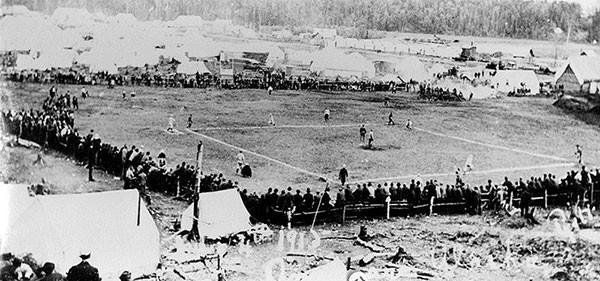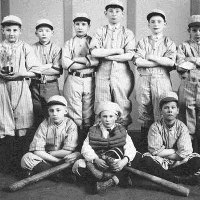
Alberta Pyatt, AMRC. General Photograph File, AMRC-b79-1-83
Missing the comforts of home, residents of the Ship Creek tent city built a baseball diamond. They celebrated the Fourth of July 1915 with this inaugural game.
Baseball is as American as hot dogs, peanuts and beer, and summer sunburn. But baseball is also spectacularly northern and Alaskan. How about a night game, with no lights? Happens in the land of the Midnight Sun every summer.

Baseball grew up with the north. On Hometown Alaska, public historian Katie Ringsmuth will share the history of baseball in Alaska, but also some unexpected cultural threads and influences—such as indigenous baseball, baseball diamonds on ice, all-women teams and integrated teams. All are a part of our state’s rich baseball history.
You may remember the Anchorage Museum’s centennial exhibit dedicated to the sport, Home Field Advantage: Baseball in the Far North. Ringsmuth curated that exhibit and has fascinating stories to tell.
HOST:
GUEST:
- Katie Ringsmuth, historian and curator of Home Field Advantage: Baseball in the Far North, Anchorage Museum
LINKS:
- Home Field Advantage: Baseball in the Far North, Anchorage Museum exhibit
- Alaska Baseball League, Wikipedia
- Baseball in Alaska, Alaska State Museum
- Innings under the Midnight Sun: Museum exhibit links baseball with the history of Alaska, Alaska Dispatch News May 14, 2015
- Baseball in the Great White North, Think Blue LA blog
- Baseball in Alaska: No night games, even at night, San Jose Mercury News blog, July 20, 2015
- Ken Burns America, Jackie Robinson, PBS documentary
- Jackie Robinson, a new Ken Burns film, only on PBS, Salon.com
REPEATED BROADCAST: Wednesday, October 12, 2016, 2:00 & 8:00p.m.
SUBSCRIBE: Get Hometown, Alaska updates automatically — via email, RSS or podcasts.
Eric Bork, or you can just call him “Bork” because everybody else does, is the FM Operations Manager for KSKA-FM. He oversees the day-to-day operations of the FM broadcast. He produces and edits episodes of Outdoor Explorer, the Alaska-focused outdoors program. He also maintains the web posts for that show. You may have heard him filling in for Morning Edition or hosting All Things Considered and can still find him operating the soundboard for any of the live broadcast programs.
After escaping the Detroit area when he was 18, Bork made it up to the Upper Peninsula of Michigan, where he earned a degree in Communications/Radio Broadcasting from Northern Michigan University. He spent time managing the college radio station, working for the local NPR affiliate, and then in top 40 radio in Michigan before coming to Alaska to work his first few summers. After then moving to Chicago, it only took five years to convince him to move back to Alaska in 2010. When not involved in great radio programming he’s probably riding a bicycle, thinking about riding bicycles, dreaming about bikes, reading a book, or planning the next place he’ll travel to. Only two continents left to conquer!




